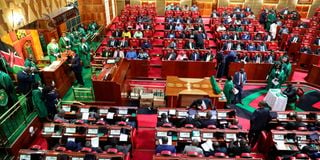Premium
Finance Bill: House team cuts housing levy, retains 16pc VAT on fuel plan

Taxpayers will be digging deeper into their pockets after the Finance committee unanimously agreed to the proposal in the 2023 Finance Bill to increase VAT on petroleum products from eight per cent to 16 per cent.
Taxpayers will dig deeper into their pockets after the Finance committee unanimously agreed with the proposal in the Finance Bill, 2023 to increase Value Added Tax (VAT) on petroleum products from 8 per cent to 16 per cent.
The committee, in a report on the Bill tabled in the House last evening, however, reduced the controversial housing levy from 3 per cent to 1.5 per cent.
The Finance and National Planning committee also increased the threshold for firms paying turnover tax from 500,000 to Sh1 million, and pegged the tax at 3 per cent.
The committee has further proposed a reduction of the withholding tax for digital content creators from the 15 per cent to 5 per cent and locally manufactured cellular phones have been spared excise duty.
The committee said while the cost of living has been on the rise, retaining VAT at 8 per cent will see the government lose much-needed revenue.
“The government stands to lose as petroleum businesses become perpetual creditors, which in turn impacts quality of service delivery by the government to the citizenry,” committee chair Kimani Kuria said. “Therefore, this calls for an end to the subisidised rate of 8 per cent.”
He said the cost of living has been on the rise not only in Kenya but all over the world.
“While the government appreciates the impact of increasing Value Added Tax on petroleum products as proposed in the Bill, the committee notes the negative impact of retaining VAT at 8 per cent, which outweighs the positives,” Mr Kimani said during a press conference at Parliament last evening.
However, he noted, Kenyans will benefit from the zero-rating of liquified petroleum gas (LPG) and cylinders, while also promoting clean energy. Mr Kimani said the committee has adopted several proposals from stakeholders, including zero-rating assembly of electric vehicles and buses and clean cooking stoves.
“We have zero-rated the use of biofuels, LPG and gas cylinders. All components used for assembly of electric motor vehicles, motorcycles and bicycles. We also have zero-rated batteries and components used for making solar panels,” he said.
Mr Kimani said transactions on digital assets have over the years not been captured in the taxation system. He added that millions of shillings are transacted in digital form, necessitating the introduction of tax on digital assets.
“The committee appreciates that mobile telephone penetration and innovation has grown from a quarter to over 80 per cent of the population in less than two decades, making Kenya one of the worlds’ leading users of mobile payments,” he said.
On manufacturing, the committee has proposed a 17 per cent export levy to protect local cement and steel manufacturing sectors.
“The committee has in its deliberations offered a number of reprieves to support the manufacturing sector and in particular local companies through deletion of excise duty on local products and increasing export and investment promotion levy rates on imported products,” he said.
“Local products protected against increase in excise duty include sugar while those affected by exports and investment promotion levy include cement clinker, bars and rods of iron among others,” he added.
The committee has proposed to reduce VAT on rental income from 10 per cent to 7.5 percent, while Kenyans who earn more than Sh800,000 per month will pay a maximum pay-as-you-earn rate of 35 per cent. It also introduced another band that will see those earning between Sh500,000 and Sh800,000 pay 32 per cent.
Business that collect excise duty on behalf of the government will be required to remit the taxes within five days instead of the initially proposed 24 hours.
The committee has also deleted the proposal to exempt transfer of business as a going concern from VAT.
“With the deletion of exemption of VAT on transfer of business as a going concern, it means the government can collect up to Sh330 billion in total through the Finance Bill. This is more than the projected Sh200 billion,” Mr Kimani said.






